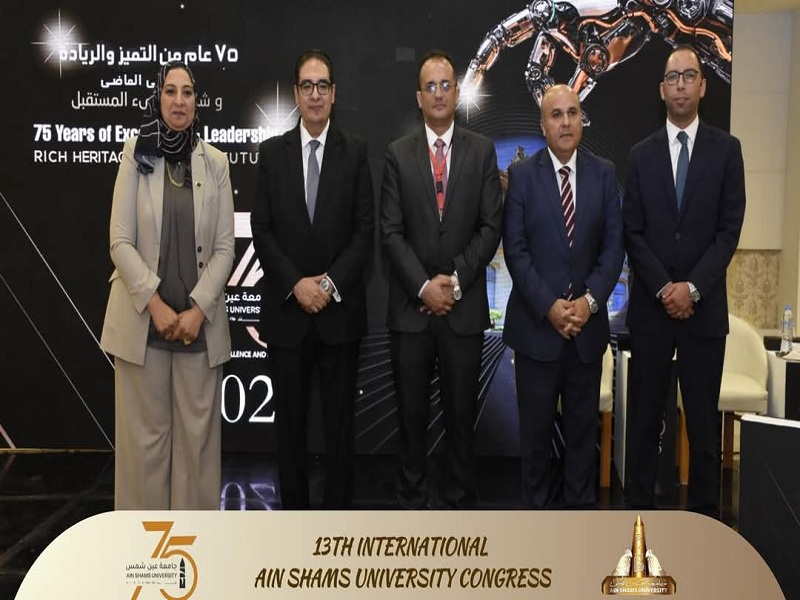The 13th International Scientific Conference of Ain Shams University discusses private universities in Egypt: "Opportunities and Prospects."
Under the patronage of Prof. Mohamed Ayman Ashour, Minister of Higher Education and Scientific Research, and Prof. Mohamed Diaa Zain El-Abedeen, President of Ain Shams University, Prof. Ghada Farouk, Vice President for Community Service and Environmental Development, inaugurated the session on private universities in Egypt, "Opportunities and Horizons," at the 13th International Scientific Conference of Ain Shams University, under the slogan "75 Years of Excellence and Leadership... An Eye on the Past and a Sun Enlighten the Future."
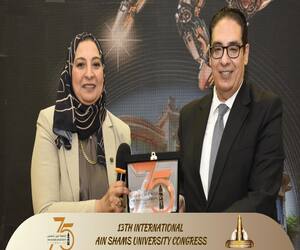 |
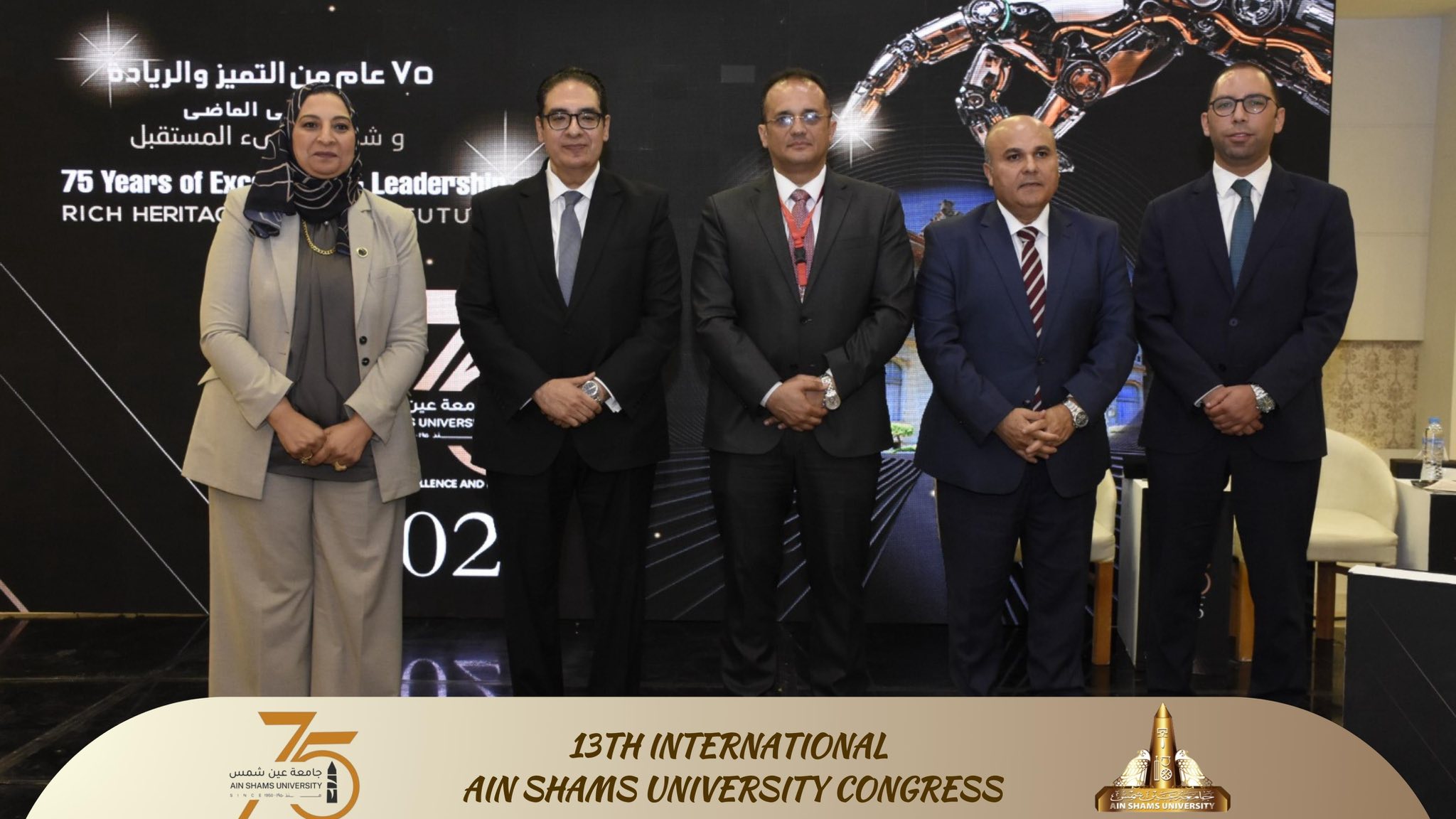 |
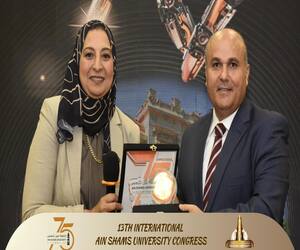 |
||
She reviewed the position of Ain Shams International Private University, south of the capital, as well as the proposed program plans and areas of international cooperation. Prof. Ghada Farouk explained that the Council of Ministers had approved Resolution No. (75) of 2022, considering the Ain Shams Private University project a national project. On March 26, 2025, the Council of Ministers approved the draft presidential decree to establish a private university called "Ain Shams Private University" at the entrance to the Administrative Capital from Ain Sokhna Road. The university consists of the following faculties: Engineering, Computers, Information and Artificial Intelligence, Business, Science, Agriculture, Languages and Humanities, Media, and Human Medicine. Dentistry, nursing, and law, and it will establish specialized colleges, higher institutes, and other research units. She pointed out that the establishment of private universities in Egypt aims to achieve several strategic objectives, the most important of which are expanding access to higher education, accommodating the increasing number of Egyptian students and providing additional study seats for them, especially in light of the limited capacity of public and private universities, and offering modern and advanced academic programs comparable to those offered at prestigious international universities, with a focus on quality in the educational process and scientific research.
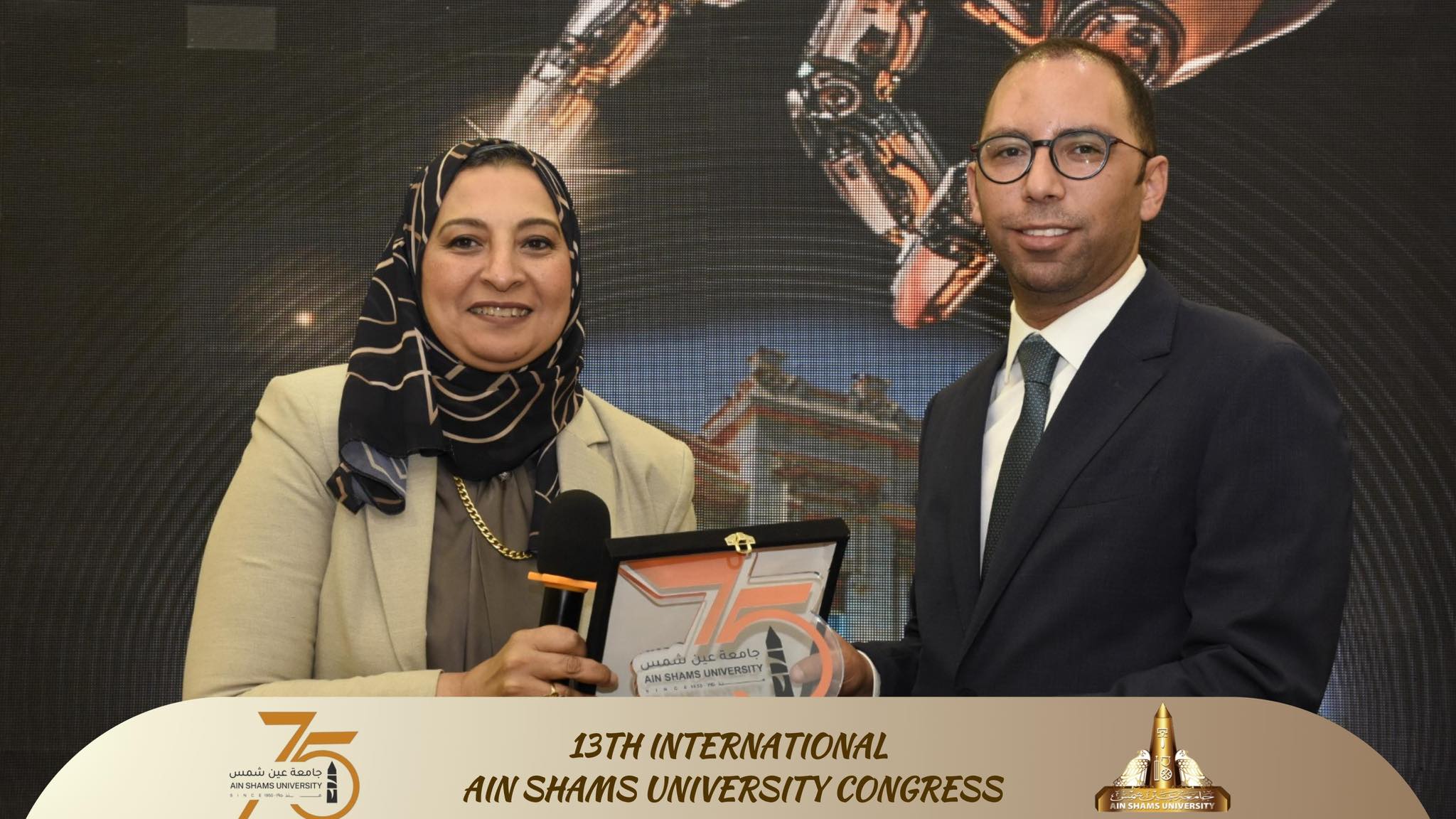 |
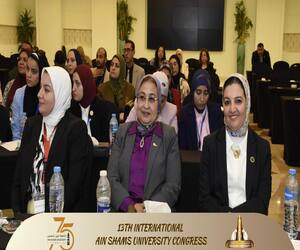 |
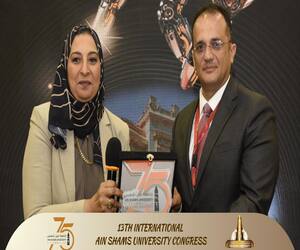 |
||
She added that private universities meet the needs of the labour market and prepare qualified cadres capable of competing and contributing to economic and social development and creating a positive competitive environment among universities.
Regarding Ain Shams Private University, Prof. Ghada Farouk explained that it will be established according to an unconventional vision called the Learning and Innovation Valley, which relies primarily on linking education and scientific research with industry and labour market requirements through the Technology Oasis, which includes research centres, technology incubators, and startups, in partnership with industry partners.
- It will be located on an area of 192 acres, working alongside the education, training, and scientific research system for academic programs that stimulate innovative youth, whether they are young professionals or professionals. At the undergraduate or graduate level, and in accordance with the requirements of the local, regional, and global markets, this provides students with the opportunity to enroll in Ain Shams University's faculties based on the numbers allocated to each faculty. This is achieved by utilizing the resources and expertise available at Ain Shams University, including academic programs and faculty members.
Professor Ghada Farouk indicated that several partnerships have been signed with foreign universities to ensure the provision of distinguished educational programs and create job opportunities for graduates in the international labor market. These partnerships include:
University of East London, University of Exeter (UK), University of Essex (UK), Queen Mary University of London (London), Fukui University (Japan), University of Strasbourg (France), University of Stuttgart (Germany), Flinders University (Australia), and University of Sharjah (United Arab Emirates).
Prof. Mohamed Sami Abdel Sadek, President of Cairo University, spoke about private universities and their impact on the educational process; the generation of private universities, and private universities that emerged from private universities. He added that Cairo University was the first private university. His Excellency also addressed the relationship between public, private, and private universities, which are being established. By a natural or legal person.
He added that there are approximately 12 private universities that are spin-offs from public universities.
He emphasized the importance of private universities, which must meet international standards to raise rankings, while offering distinguished programs linked to the needs of the labor market and industry.
Regarding the advantages of private universities, the President of Cairo University explained that one of the most important advantages of private universities is that they overcome all the routine obstacles present in public universities. For example, faculty members are contracted for specific periods that are renewed based on competence.
In addition, there are numerous benefits and significant opportunities for students to receive a quality education and establish broader partnerships with various institutions in exchange for appropriate financial returns.
Professor Mohamed El-Shenawy, President of Al-Jalala Private University, spoke about the experience of Al-Jalala Private University—the first generation of private universities in Egypt—and its future vision. He explained that Al-Jalala University is among the first generation of private universities, such as Al-Jalala, King Salman, and New Alamein, which complement public universities. He added that the establishment of 125 universities in less than ten years is a true achievement that no one had anticipated. He also explained that any success achieved by private universities is based on those coming from public universities, reviewing the experience of Galala University, which targets 25,000 students during its first ten years since its establishment.
He also pointed to the 553 faculty members, many of whom hold degrees from abroad, in addition to nine visiting professors from several European and Arab countries.
Professor Mohamed El-Shenawy added that Galala University places an emphasis on student research and actively links it with industry partners and holds employment forums. The
university has also treated 24,000 citizens from the city of Suez. The university has also published 1,114 research papers in various disciplines.
Professor Mohamed Safi, Dean of the Faculty of Law, reviewed how private universities are managed, their resources and how to manage them, and the Private Universities Council. He also addressed the relationship between private and public universities, particularly those established by the government, and shed light on the current status of private universities.
He explained the legal framework regulating the operation of private universities in the Arab Republic of Egypt. He pointed to the expansion of the establishment of this type of non-profit university, which is subject to the supervision of boards of trustees and spread throughout the country, offering a wide range of specializations.
He added that this legal framework is based on a set of official documents, starting with the republican decrees and laws regulating the establishment of these universities, continuing with the model internal regulations that define their working mechanisms, and ending with the decisions issued by the boards of trustees and the universities themselves.
Prof. Safi, Dean of the Faculty of Law, explained the mechanism for establishing private universities, which begins with a presidential decree based on the approval of the Council of Ministers. He emphasized the need to submit detailed data and documents when requesting establishment. He also specified the composition of the university council, which includes faculty and department leaders and faculty members.
His Excellency stated that with regard to administration, the Board of Trustees is primarily responsible for running the university and includes experienced and competent individuals. The university president performs academic, administrative, and financial duties under the supervision of this council.
He added that the Private Universities Council is established by a decree from the Minister of Higher Education and is responsible for monitoring, developing, and ensuring the quality of the educational and research process at its affiliated universities.
Dr. Kamal Obeid, Director of the International Cooperation Department, discussed the international partnership models currently available to private universities, ways to enhance these collaborations, and how to maximize their benefits, especially with regard to their impact on the parent university. New private universities play a pivotal role in developing Egypt's higher education system, not only by offering modern programs that keep pace with the labor market, but also by building strategic international partnerships with prestigious international universities. In this context, the university's International Relations Office plays an institutional and integrated role in organizing these partnerships. In terms of mechanism, the university follows systematic steps, beginning with identifying its strategic priorities in light of its vision and mission. A thorough assessment of labor market needs, the country's trends in areas of specialization, and areas in need of development, such as artificial intelligence, health sciences, energy, and information technology, is also conducted. Appropriate international partners are then identified according to internationally recognized academic and quality standards (such as global rankings, academic accreditation, and research reputation). The types of academic programs offered in collaboration with various foreign universities are also identified, including dual degree programs, joint degree programs, academic twinning programs, academic exchange programs for students and faculty members on a semester or annual basis, as well as joint research or professional graduate programs. The study also shed light on the business models governing these partnerships, most notably the institutional partnership model, where a joint center or college is established within the Egyptian university with joint management. The international branch model, where a foreign university opens a branch in Egypt in collaboration with a private university, and the program delivery model within a private university, where the foreign university offers a program within the Egyptian campus through Egyptian and foreign academic staff. Finally, the licensing and accreditation model grants the foreign university the right to offer its academic program at the Egyptian University, while adhering to all quality and accreditation standards.
Dr. Kamal Obeid also addressed the institutional framework governing these partnerships, which includes several entities to ensure governance and follow-up through the University's International Relations Office, which is responsible for communicating and coordinating with foreign partners and monitoring the implementation of agreements. He also discussed the relevant academic sectors, which conceptualize the programs and contribute to the development of curricula, along with legal units to ensure the validity of contractual formulation and the preservation of rights, as well as the quality and accreditation units, the University Council, and the Board of Trustees.
Regarding maximizing the benefits of these partnerships, His Excellency explained that there are many different aspects to the existence of private universities, including building the academic and administrative capacities of Egyptian universities, localizing technology and modern teaching methods through knowledge transfer, providing opportunities for students to obtain an international education without the need to travel abroad, enhancing the competitiveness of graduates in the local and international markets, attracting international faculty members and experts to participate in the educational process, stimulating joint scientific research and projects with a societal impact, and attracting foreign direct investment in the higher education sector.


.svg)

